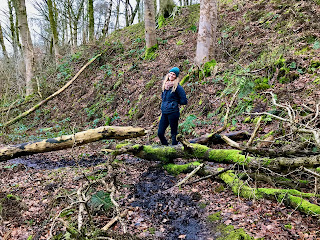Daughters of Jerusalem
 |
| Mostly green! My daughter taking me on a long hike in England. |
Scripture:
Luke 23:26 As they led him away, they seized a man, Simon of Cyrene, who was coming from the country, and they laid the cross on him, and made him carry it behind Jesus. 27 A great number of the people followed him, and among them were women who were beating their breasts and wailing for him. 28 But Jesus turned to them and said, “Daughters of Jerusalem, do not weep for me, but weep for yourselves and for your children. 29 For the days are surely coming when they will say, ‘Blessed are the barren, and the wombs that never bore, and the breasts that never nursed.’ 30 Then they will begin to say to the mountains, ‘Fall on us’; and to the hills, ‘Cover us.’ 31 For if they do this when the wood is green, what will happen when it is dry?”
Observation:
Jesus was exhausted after a night of beatings and trials, and yet, immediately the religious officials wanted him to be crucified. Usually a criminal had to carry their own cross to the site of their execution, but he was simply worn out, therefore they grabbed another man to carry it for him.
Luke, again, brought women into the picture. Those who were weeping and beating their breasts would have been grieving Jesus’ suffering and death. These women remained loyal to him, even when others were willing to discard him. Even in this moment, Luke used the opportunity of the presence of the women to speak to the Israelites who were rejecting Jesus.
Jesus looked at the women — another mark of Luke’s writing. Jesus looked and he saw — even in the most trying of moments. He had seen Peter in the moment of denial, and here he saw the women in the time of his suffering. He spoke to them, referring to them as “Daughters of Jerusalem.” This phrase had appeared in the Old Testament and now here, as a reference to Israel. Jesus was speaking prophetically, that while it may have seemed that there was simply sadness over the death of one person, Israel did not understand what was coming. The days ahead were going to much worse for Israel than the death of one man, and they would literally cry out for their own death to come quickly.
Ultimately he declared his condemnation on what the Jews had done. There were those there who had faith, for the weeping women represented those who believed, and therefore the wood was still “green” — it still had a bit of life. The warning, however, was for the future, when there would no longer be any faith, the wood would be dry, and burn up in an instant. This was to be the fate of the city, but it was not the end of faith. The presence of the women represented the green wood, the new faith that would lead the church forward, even after his death and resurrection.
Application:
We are to live as genuine “Daughters of Jerusalem.” In a world where faith may seem to become like dry wood, there remains a green remnant. Those with a faith that is alive should follow as near the Savior as possible. The old and dry wood may be burned away, but genuine faith will remain.
Sadly, there’s plenty of wood stacking up these days that is far too dry. This makes for easy kindling and a rapid destruction. The only way that faith remains alive is through intentional investment in knowing and loving Christ.
Prayer:
Lord, I want to know you more today, and tomorrow, and the day after tomorrow. Amen.
Comments
Post a Comment